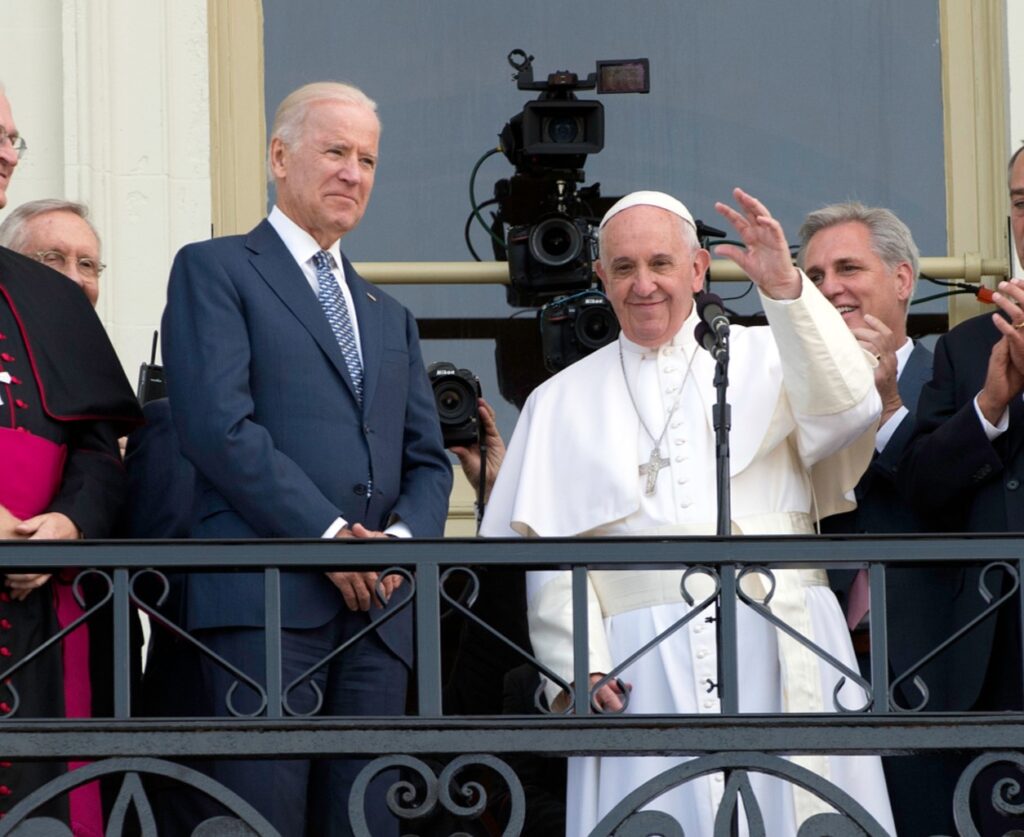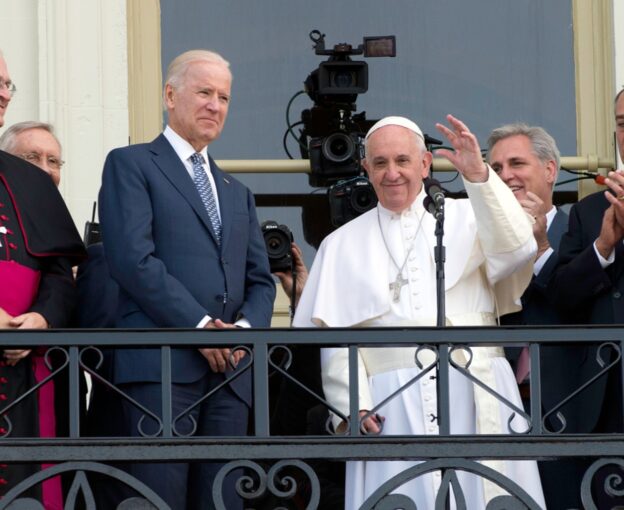
Francis, Biden Model Doing What We Can for Climate Justice
Mary J. Novak
October 4, 2023
Climate change vexes U.S. politics for numerous reasons. Many people have bought into the intentional, decades-long propaganda machine of interests who wish to see no action taken on climate change. But even among people of goodwill, it can be difficult to stay meaningfully engaged on an issue this big. Al Gore named this way back in 2006, that “there are a lot of people who go straight from denial to despair without pausing on the intermediate step of actually doing something about the problem.”
Happily, President Biden and Pope Francis are among the people willing and able to do something. The events of recent days make that overwhelmingly clear.

Pope Francis stands with then-Vice President Joe Biden on the balcony of the U.S. Capitol during the pope’s September 2015 visit to the U.S. The visit took place three months after the publication of Laudato Si’, the pope’s encyclical on ecology. Photo: U.S. Capitol
President Biden, whose administration essentially had to rebuild the Environmental Protection Agency since taking office and who has laid the groundwork for long-term ecological transformation with provisions of the Inflation Reduction Act, made a bold move in September with the announcement of the American Climate Corps program. The program is slated to train and employ 20,000 people in climate jobs that include land restoration projects, clean energy, and bolstering resilience to natural disasters.
Pope Francis has been an even more vocal advocate on climate. In his 2015 letter, Laudato Si’, “On Care for Our Common Home,” he asserted the rightful place of environmental protection within the identity of being a Christian: “Living our vocation to be protectors of God’s handiwork is essential to a life of virtue; it is not an optional or a secondary aspect of our Christian experience.”
And now, Pope Francis is releasing another document on October 4, the feast of St. Francis of Assisi. Laudate Deum will be a follow-up on his 2015 letter, updated to reflect the realities of 2023. In the intervening years, the Vatican has taken up the Laudato Si’ Action Platform, an initiative to help individuals and institutions develop plans for concrete action in response to the ecological crisis our Earth suffers.
What is most hopeful about the actions taken by these two leaders is that they reflect their putting to good use their platforms as leader of the free world and global spiritual leader, respectively. It is this clear discernment of responsibility that has guided NETWORK to add climate justice to our political ministry (aka portfolio) in response to requests by Catholic organizations both national and local.
The Biden administration explicitly links the American Climate Corps initiative to the Civilian Conservation Corps, the New Deal program that ran for a decade, employing millions of people in the U.S. with the work of restoring public lands and building infrastructure in national parks. This precedent in U.S. history places President Biden on a solid foundation. Similarly, Pope Francis’ writing on ecology fits within the precedent of over 130 years of popes responding to world conditions in the light of the Gospel. This body of work — that we call modern Catholic social teaching — addresses a range of issues including labor rights, economic solidarity, global human development, and peace. Again, this is a solid moral foundation and a framework that shows how care for the environment – like any social issue — does not exist in a vacuum.
Climate justice is essential grounding for all forms of justice. Both President Biden and Pope Francis know this. It will require dismantling an economy based on extraction and exploitation — of both land and people — in order to build an economy of reciprocity and sustainability for all people. Pope Francis has spoken strongly on the intrinsic intersections of ecological destruction and colonialism, racism, militarism, and global capitalism. The resulting increases in natural disasters, habitat destruction, famine, drought, air pollution, and displacement are injustices that disproportionately affect the most marginalized populations across the world — populations that contribute the least to climate change. If we are to get serious about working for racial justice, addressing environmental racism and ecological destruction must be part of our work. Recognizing our interdependence stems from an ethic of integral ecology that is rooted in care for creation.
President Biden and Pope Francis show us how to act in accordance with the truth of our interdependence while we own the responsibility and power we have been given in the face of this global challenge. May the actions of these two world leaders inspire more and more of us to action, with love, courage, and moral conviction.







